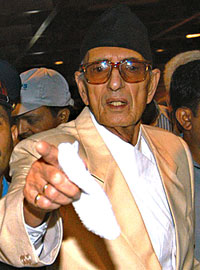 With Nepali Congress President Girija Prasad Koirala set to return as prime minister, a lot of Nepalis seem to be scratching their heads. After all that has happened over the past three tumultuous weeks, not too many people seem to have revised their view of the grand old man.
With Nepali Congress President Girija Prasad Koirala set to return as prime minister, a lot of Nepalis seem to be scratching their heads. After all that has happened over the past three tumultuous weeks, not too many people seem to have revised their view of the grand old man.The internet is full of lamentations on how the man who supposedly symbolized all that went wrong in Nepal between 1990 and 2002 could end up making such a heroic comeback. Public ire may be focused on King Gyanendra and Crown Prince Paras, but Koirala comes a close third.
Maila Baje found two interesting points in the overall debate. Some wonder why the Seven-Party Alliance (SPA), stymied until the other day by its inability to agree on a consensus candidate for premier, could rally behind Koirala with such alacrity.
Others are baffled why someone who has already served three times as an elected prime minister would even want to accept such a thankless job in the eighth decade of his life. The first is easy to guess. None of the other SPA leaders were confident enough to grapple with such a huge mess. King Gyanendra’s restoration of the House of Representatives – a demand Koirala has consistently put forth over last four years -- was bound to infuriate the Maoists, who have denounced the SPA for betraying the people. Carving out enough space between humbled royals and hurt rebels is no enviable task.
The Nepali Congress remains the majority party in the lower house. The Nepali Congress Parliamentary Party (NCPP) remains undivided, since the organization split after Prime Minister Sher Bahadur Deuba dissolved the legislature in 2002.
Technically, Deuba remains the NCPP leader and should have been returning as premier. But the poor guy was the first to recommend Koirala for the job. (As jinxes go, Deuba perhaps recognizes that a third sacking would certainly have driven him out of politics.)
But why did Koirala accept? Probably because of two people. Although a year or two older than Krishna Prasad Bhattarai, who turned down King Gyanendra’s offer to become premier, Koirala is more agile mentally and physically.
More importantly, though, Koirala must have recalled the experience of Ganesh Man Singh in the aftermath of the People’s Movement of 1990. When the then-supreme commander declined the premiership, many thought his ill health must have played a part.
A few cynics questioned the status of Singh’s mental health as well when he urged King Birendra to lead the new government. Diehard Singh supporters were impressed by what they considered a Gandhian gesture of self-abnegation.
Soon Ganesh Man Singh’s critics within the Nepali Congress started making fun of his decision – a process that snowballed into a pro-Koirala momentum within the party. Singh himself could be heard later insisting that he did not spurn the premiership for lack of ability.
Having led – at least theoretically – a movement that dwarfed the 1990 protests, Koirala must have felt further energized not to repeat Singh’s misjudgment.